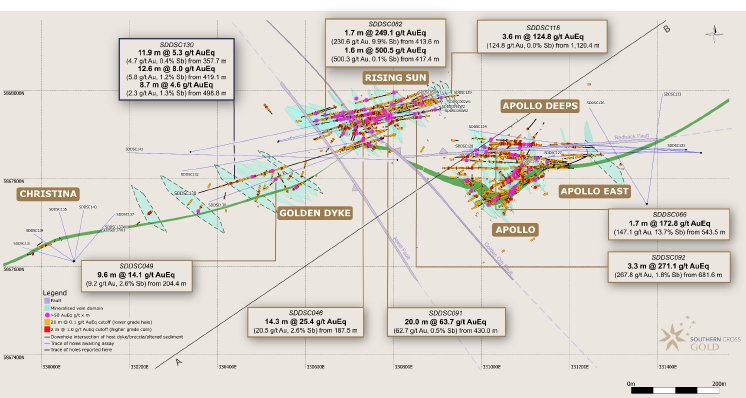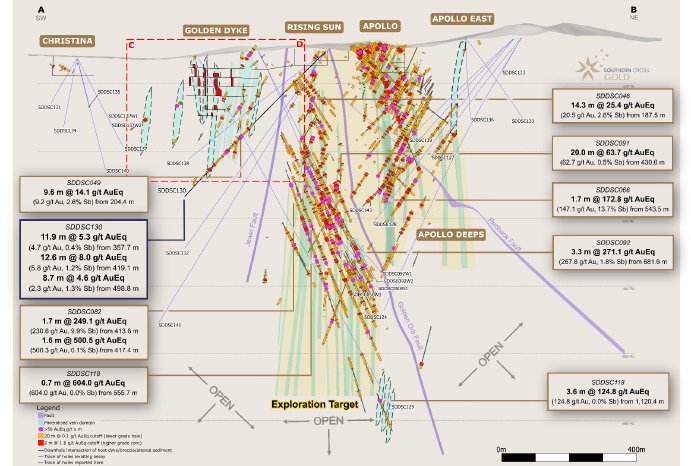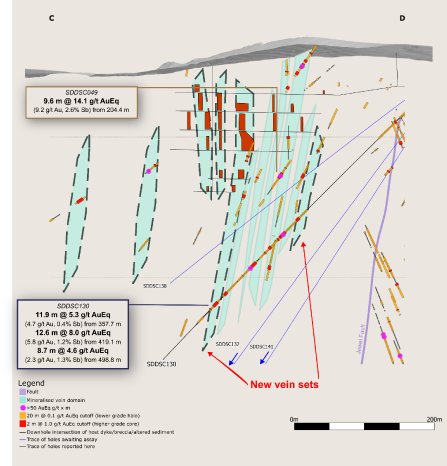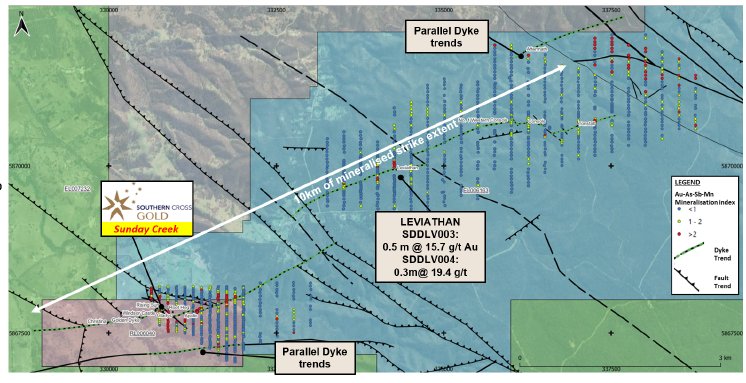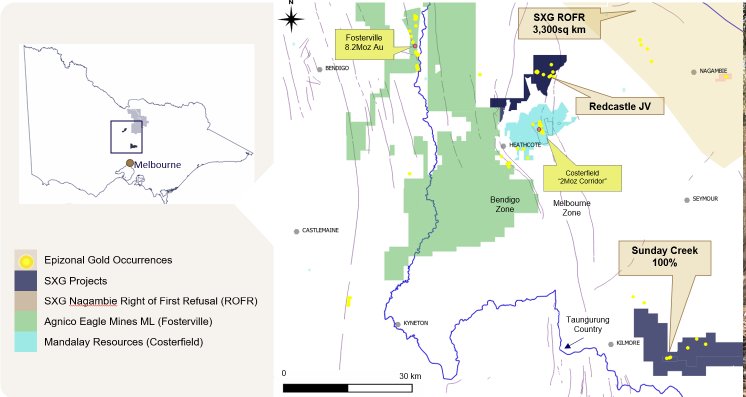Michael Hudson, Mawson Interim CEO and Executive Chairman, states: "Game on! The scale of the Sunday Creek gold-antimony system continues to grow impressively. This new discovery is located 260 m and 600 m west respectively of the Rising Sun and Apollo mineralized bodies. The expanding Sunday Creek system coupled with the 60 km of diamond drilling planned over the next year means we are well on our way to meet our aim to double the size of the Sunday Creek exploration target. Golden Dyke now joins Rising Sun and Apollo as the third high-grade mineralized domain in this exciting project.
“Our team’s systematic drill approach led us to the new discovery, after we targeted the main dyke breccia host structure (the “rails” of the ladder) by N-S drilling, as previously reported in drillholes SDDSC125-126. Quickly, we were then able to drill SDDSC130, the first drill hole in an E-W orientation beneath the historic Golden Dyke mine, that intersected seven high-grade vein sets (the “rungs” of the ladder) at a high angle, over 230 m down hole interval (135 m ETW).
“The mineralization intersected in SDDSC130 remains open both up and down dip, as well as 500 m to the west towards the historic Christina mine where we have five drill holes pending results. Three additional E-W holes (SDDSC132, 138, 141 – Figures 1 and 2) have been completed, or in progress below Golden Dyke, with results pending. Given this discovery, the Company has already planned a significant number of further holes under Golden Dyke.”
Drill Hole Discussion
SDDSC130 is the first hole at Golden Dyke to drill parallel to and within the dyke/breccia host structure (the ladder “rails”) and at a high angle to mineralized veins (the ladder “rungs”). The hole was successful and overall intercepted eight high-grade vein sets. Beneath the historic Golden Dyke mine, seven high-grade vein sets were intersected over 230 m down hole interval (135 m ETW). The hole included ten occurrences of visible gold, nine assayed intervals of > 20 g/t Au (up to 124 g/t Au) and ten assayed intervals of > 5% Sb (up to 31.5% Sb).
Broad downhole intercepts (no lower cut) included 214.4 m @ 1.3 g/t AuEq (1.1 g/t Au, 0.1% Sb) from 320.4 m including 94.5 m @ 2.3 g/t AuEq (1.5 g/t Au, 0.4% Sb) from 419.1 m.
The hole provided a 100 m down dip extension to three existing vein sets, infill information for three vein sets in addition to two new vein sets (Figures 2 and 3). This drill hole displayed similarities in mineralization style to that of analogous holes in the upper portion of Rising Sun, demonstrating Golden Dyke is the third known significant mineralized body on the project. Further drilling in a similar orientation (parallel to the ladder ‘rails’ – SDDSC132, 138, 141) (Figures 2 and 3) will continue to provide information about the size and extent of mineralized shapes at depth.
This hole occurs in the geological upper portion of the mineralized system, indicated by the presence of brittle structures, open space breccias and mineralized veins, with abundant massive stibnite occurring in quartz-carbonate veins. While the grade tenor of SDDSC130 is considered significant, analogues at Rising Sun and Apollo have shown that the tenor of gold mineralization is likely to increase with depth. SDDSC130 also provided an exceptional example of continuity and width of mineralized structures at Sunday Creek, with 11.9 m @ 5.3 g/t AuEq (4.7 g/t Au, 0.4% Sb) from 357.7 m occurring 82 m down plunge of SDDSC049 (9.6 m @ 14.1 g/t AuEq (9.2 g/t Au, 2.6% Sb) – November 8, 2022) and being interpreted as a continuous vein set.
Pending Results and Update
SDDSC130 is the first hole of several east to west trending holes (SDDSC132, 138, 141) in a program to further test and understand the breadth of mineralization at Golden Dyke by utilising structural controls provided by the previously announced drill holes SDDSC125 and SDDSC126 (August 27, 2024).
Nineteen holes (SDDSC123-124, 127-128, 131-140, 137W1, 140, 050W1, 050W2, 092W1) are currently being processed and analyzed, with five holes (SDDSC129, 137W2, 141, 143, 092W2) in progress (Figure 1 and Figure 2).
Exploration Target
On January 23, 2024, SXG announced the maiden gold and antimony Exploration Target at its flagship 100%-owned Sunday Creek Project in Victoria, Australia. The Exploration Target ranges reported are shown in Table 1. Notably, the Exploration Target was constrained to the current drill footprint at Apollo and Rising Sun as they contain sufficient drilling to determine continuity and infer grade ranges. This represents approximately one third to one half the strike of the main drill area and significant potential exists to increase the size of the exploration target with high grade drill results drilled for up to 450 m beyond the Exploration Target area. Drilling since January has significantly expanded the footprint of mineralization beyond the bounds of the exploration target area, especially including SDDSC130 announced in this press release (Figure 2).
The potential quantity and grade of the Exploration Target is conceptual in nature and therefore is an approximation. There has been insufficient exploration to estimate a Mineral Resource and it is uncertain if further exploration will result in the estimation of a Mineral Resource. The Exploration Target has been prepared and reported in accordance with the 2012 edition of the JORC Code.
Further Information
Further discussion and analysis of the Sunday Creek project by Southern Cross Gold is available on the SXG website at www.southerncrossgold.com.au.
No upper gold grade cut is applied in the averaging and intervals are reported as drill thickness. During future Mineral Resource studies, the requirement for assay top cutting will be assessed.
Figures 1 to 5 show project location, plan and longitudinal views of drill results reported here and Tables 2 to 4 provide collar and assay data. The true thickness of the mineralized intervals reported individually as estimated true widths (“ETW”), otherwise they are interpreted to be approximately 40% to 70% of the sampled thickness for other reported holes. Lower grades were cut at 1.0 g/t AuEq lower cutoff over a maximum width of 2 m with higher grades cut at 5.0 g/t AuEq lower cutoff over a maximum of 1 m width unless specified.
Critical Metal Epizonal Gold-Antimony Deposits
Sunday Creek is an epizonal gold-antimony deposit formed in the late Devonian (like Fosterville, Costerfield and Redcastle), 60 million years later than mesozonal gold systems formed in Victoria (for example Ballarat and Bendigo). Epizonal deposits are a form of orogenic gold deposit classified according to their depth of formation: epizonal (<6 km), mesozonal (6-12 km) and hypozonal (>12 km).
Epizonal deposits in Victoria often have associated high levels of the critical metal, antimony, and Sunday Creek is no exception. China claims a 56 per cent share of global mined supplies of antimony, according to a 2023 European Union study. Antimony features highly on the critical minerals lists of many countries including Australia, the United States of America, Canada, Japan and the European Union. Australia ranks seventh for antimony production despite all production coming from a single mine at Costerfield in Victoria, located nearby to all SXG projects. Antimony alloys with lead and tin which results in improved properties for solders, munitions, bearings and batteries. Antimony is a prominent additive for halogen-containing flame retardants. Adequate supplies of antimony are critical to the world's energy transition, and to the high-tech industry, especially the semi-conductor and defence sectors where it is a critical additive to primers in munitions.
In August 2024, the Chinese government announced it will place export limits on antimony and antimony products. This will put pressure on Western defence supply chains and negatively affect the supply of the metal and push up pricing given China’s dominance of the supply of the metal in the global markets. This is positive for SXG as we are likely to have one of the very few large and high-quality projects of antimony in the western world that can feed western demand into the future.
Antimony represents approximately 20% in situ recoverable value of Sunday Creek at an AuEq of 1.88.
Technical Background and Qualified Person
The Qualified Person, Michael Hudson, Executive Chairman and a director of Mawson Gold, and a Fellow of the Australasian Institute of Mining and Metallurgy, has reviewed, verified and approved the technical contents of this release.
Analytical samples are transported to the Bendigo facility of On Site Laboratory Services (“On Site”) which operates under both an ISO 9001 and NATA quality systems. Samples were prepared and analyzed for gold using the fire assay technique (PE01S method; 25 gram charge), followed by measuring the gold in solution with flame AAS equipment. Samples for multi-element analysis (BM011 and over-range methods as required) use aqua regia digestion and ICP-MS analysis. The QA/QC program of Southern Cross Gold consists of the systematic insertion of certified standards of known gold content, blanks within interpreted mineralized rock and quarter core duplicates. In addition, On Site inserts blanks and standards into the analytical process.
MAW considers that both gold and antimony that are included in the gold equivalent calculation (“AuEq") have reasonable potential to be recovered at Sunday Creek, given current geochemical understanding, historic production statistics and geologically analogous mining operations. Historically, ore from Sunday Creek was treated onsite or shipped to the Costerfield mine, located 54 km to the northwest of the project, for processing during WW1. The Costerfield mine corridor, now owned by Mandalay Resources Ltd contains two million ounces of equivalent gold (Mandalay Q3 2021 Results), and in 2020 was the sixth highest-grade global underground mine and a top 5 global producer of antimony.
MAW considers that it is appropriate to adopt the same gold equivalent variables as Mandalay Resources Ltd in its Mandalay Technical Report, 2024 dated March 28, 2024. The gold equivalence formula used by Mandalay Resources was calculated using Costerfield’s 2023 production costs, using a gold price of US$1,900 per ounce, an antimony price of US$12,000 per tonne and 2023 total year metal recoveries of 94% for gold and 89% for antimony, and is as follows:
???? = ?? (??) + 1.88 × ?? (%).
Based on the latest Costerfield calculation and given the similar geological styles and historic toll treatment of Sunday Creek mineralization at Costerfield, SXG considers that a ???? = ?? (??) + 1.88 × ?? (%) is appropriate to use for the initial exploration targeting of gold-antimony mineralization at Sunday Creek.
About Mawson Gold Limited (TSXV:MAW, FRANKFURT:MXR, OTCPINK:MWSNF)
Mawson Gold Limited has distinguished itself as a leading Nordic exploration company. Over the last decades, the team behind Mawson has forged a long and successful record of discovering, financing, and advancing mineral projects in the Nordics and Australia. Mawson holds the Skellefteå North gold discovery and a portfolio of historic uranium resources in Sweden. Mawson also holds 49% of Southern Cross Gold Ltd. (ASX:SXG) which owns or controls two high-grade, historic epizonal goldfields in Victoria, Australia, including the exciting Sunday Creek Au-Sb discovery.
About Southern Cross Gold Ltd (ASX:SXG)
[email=https://www.southerncrossgold.com.au/]Southern Cross Gold[/email] holds the 100%-owned Sunday Creek project in Victoria and Mt Isa project in Queensland, the Redcastle joint venture in Victoria, Australia, and a strategic 6.7% holding in ASX-listed Nagambie Resources Limited (ASX:NAG) which grants SXG a Right of First Refusal over a 3,300 square kilometer tenement package held by NAG in Victoria.
Forward-Looking Statement
This news release contains forward-looking statements or forward-looking information within the meaning of applicable securities laws (collectively, "forward-looking statements"). All statements herein, other than statements of historical fact, are forward-looking statements. Although Mawson believes that such statements are reasonable, it can give no assurance that such expectations will prove to be correct. Forward-looking statements are typically identified by words such as: believe, expect, anticipate, intend, estimate, postulate, and similar expressions, or are those, which, by their nature, refer to future events. Mawson cautions investors that any forward-looking statements are not guarantees of future results or performance, and that actual results may differ materially from those in forward-looking statements as a result of various factors, including, Mawson’s expectations regarding its ownership interest in Southern Cross Gold, capital and other costs varying significantly from estimates, changes in world metal markets, changes in equity markets, the potential impact of epidemics, pandemics or other public health crises on the Company’s business, risks related to negative publicity with respect to the Company or the mining industry in general; exploration potential being conceptual in nature, there being insufficient exploration to define a mineral resource on the Australian-projects owned by SXG, and uncertainty if further exploration will result in the determination of a mineral resource; planned drill programs and results varying from expectations, delays in obtaining results, equipment failure, unexpected geological conditions, local community relations, dealings with non-governmental organizations, delays in operations due to permit grants, environmental and safety risks, and other risks and uncertainties. Any forward-looking statement speaks only as of the date on which it is made and, except as may be required by applicable securities laws, Mawson disclaims any intent or obligation to update any forward-looking statement, whether as a result of new information, future events or results or otherwise.
